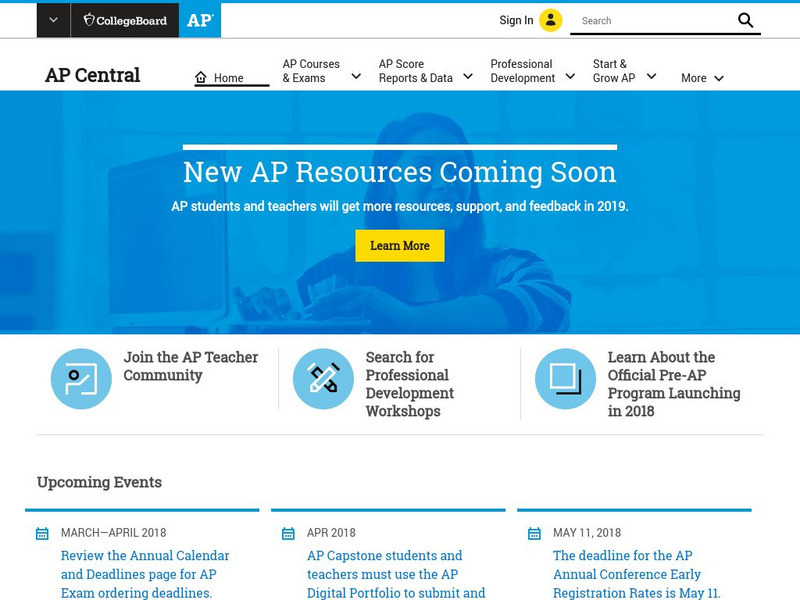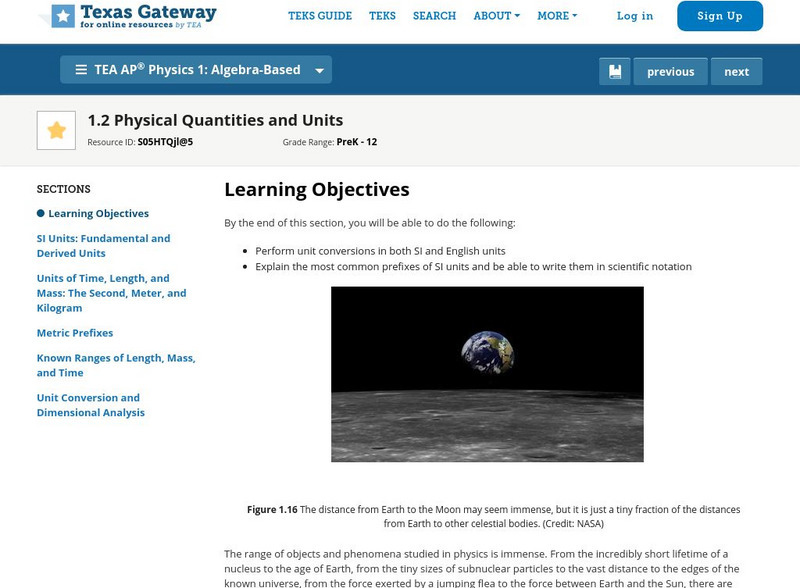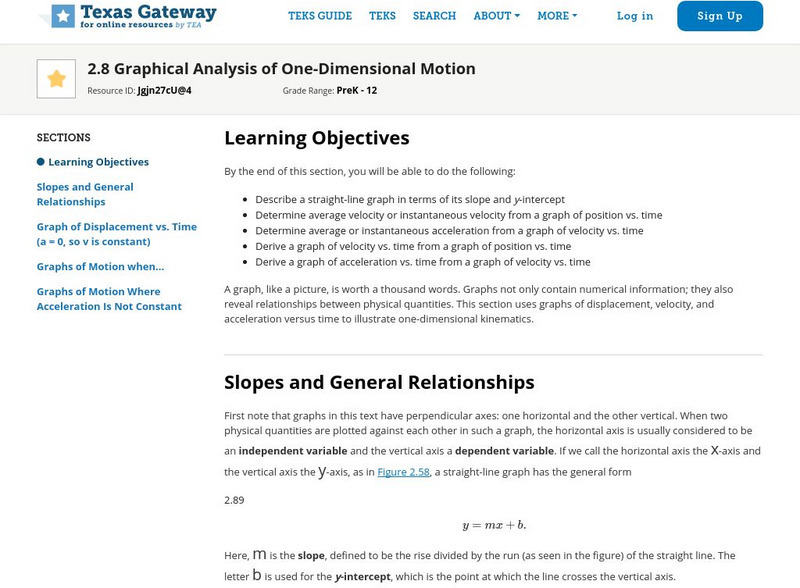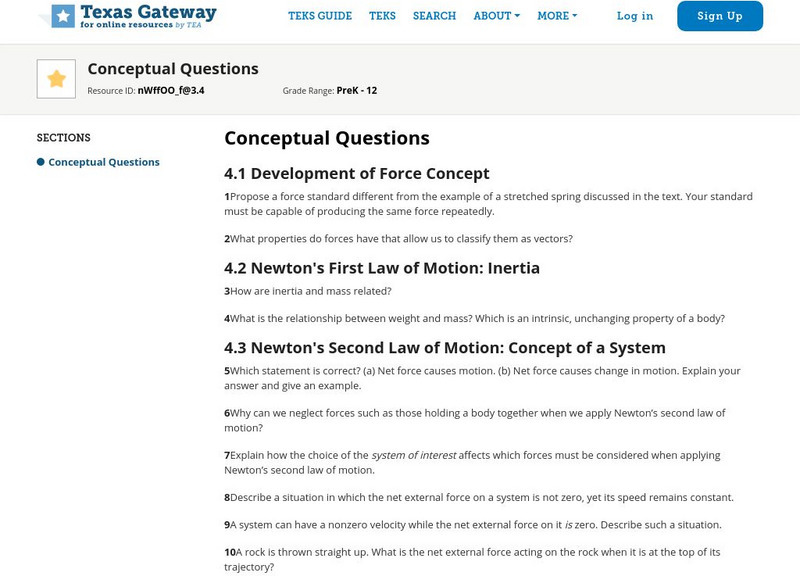Massachusetts Institute of Technology
Mit: Open Course Ware: Highlights for High School Students
AP Biology, AP Calculus, and AP Physics online resources are provided for both teachers and students. These resources are designed to prepare high school students for their AP exams.
The College Board
Ap Central: Ap Physics 1: The Course
CollegeBoard offers course information, exam information, teaching materials, articles, and suggested links for both teachers and students of AP Physics 1.
The College Board
College Board: Ap Central
This is the centralized site for information about all AP courses offered by College Board. It contains information for students and teachers about each of the AP courses (almost 40 in all), including a course description and relevant...
The College Board
Ap Central: Ap Physics C: Mechanics: The Course
CollegeBoard offers a page of resources for students and teachers of AP Physics C: Mechanics. Find course and exam information, teaching resources, featured articles, discussion groups, and more.
Texas Education Agency
Texas Gateway: 1.1 Physics: An Introduction
By the end of this section, you will be able to do the following: Explain the difference between a principle and a law and Explain the difference between a model and a theory.
Texas Education Agency
Texas Gateway: Motion Equations for Constant Acceleration in One Dimension
By the end of this section, you will be able to do the following: Calculate displacement of an object that is not accelerating, given initial position and velocity; Calculate final velocity of an accelerating object, given initial...
Texas Education Agency
Texas Gateway: Ap Physics: 2.3 Time, Velocity, and Speed
By the end of this section, you will be able to do the following: Explain the relationships between instantaneous velocity, average velocity, instantaneous speed, average speed, displacement, and time; Calculate velocity and speed given...
Texas Education Agency
Texas Gateway: Ap Physics: 2.2 Vectors, Scalars, and Coordinate Systems
By the end of this section, you will be able to do the following: Define and distinguish between scalar and vector quantities and Assign a coordinate system for a scenario involving one-dimensional motion.
Texas Education Agency
Texas Gateway: Ap Physics: Displacement
By the end of this section, you will be able to do the following: Define position, displacement, distance, and distance traveled in a particular frame of reference; Explain the relationship between position and displacement; Distinguish...
Texas Education Agency
Texas Gateway: 1.4 Ap Physics: Approximation
By the end of this section, you will be able to make reasonable approximations based on given data.
Texas Education Agency
Texas Gateway: Ap Physics: 1.3 Accuracy, Precision, and Significant Figures
By the end of this section, you will be able to do the following: Determine the appropriate number of significant figures in both addition and subtraction, as well as multiplication and division calculations and Calculate the percent...
Texas Education Agency
Texas Gateway: 1.2 Physical Quantities and Units
By the end of this section, you will be able to do the following: Perform unit conversions in both SI and English units, Explain the most common prefixes of SI units, and be able to write them in scientific notation.
Texas Education Agency
Texas Gateway: Introduction to Physics: Problems & Exercises
This site provides a list of physics problems and exercises including Physical Quantities and Units, Accuracy, Precision, and Significant Figures, and Approximation.
Texas Education Agency
Texas Gateway: Ap Physics 1 Preface
This is the preface to an AP Physics online textbook; it highlights what is covered in the course. Teaching materials are available. An OpenStax Open-Education-Resource.
Texas Education Agency
Texas Gateway: Kinematics: Graphical Analysis of One Dimensional Motion
By the end of this section, you will be able to describe a straight-line graph in terms of its slope and y-intercept, determine average velocity or instantaneous velocity from a graph of position vs. time, determine average or...
Texas Education Agency
Texas Gateway: Kinematics: Falling Objects
By the end of this section, you will be able to describe the effects of gravity on objects in motion, describe the motion of objects that are in free fall, and calculate the position and velocity of objects in free fall.
Texas Education Agency
Texas Gateway: Kinematics Problems & Exercises
This page provides problems and exercises for each section of Chapter 2: Kinematics. There are 64 questions listed by section titles.
Texas Education Agency
Texas Gateway: Kinematics in Two Dimensions: Conceptual Questions
This is a list of 21 questions focusing on the major concepts of each section of Chapter 3: Kinematics in Two Dimensions such as adding and subtracting vectors using different methods.
Texas Education Agency
Texas Gateway: Kinematics in Two Dimensions: Section Summary
This is a summary of each of the sections in Chapter 3: Kinematics in Two Dimensions of the AP Physics online text.
Texas Education Agency
Texas Gateway: Kinematics in Two Dimensions: Addition of Velocities
By the end of this section, you will be able to apply principles of vector addition to determine relative velocity and explain the significance of the observer in the measurement of velocity.
Texas Education Agency
Texas Gateway: Kinematics in Two Dimensions: Projectile Motion
By the end of this section, you will be able to identify and explain the properties of a projectile, such as acceleration due to gravity, range, maximum height, and trajectory; determine the location and velocity of a projectile at...
Texas Education Agency
Texas Gateway: Force and Newton's Laws: Conceptual Questions
This page offers 27 questions to test students' knowledge of the major concepts in each section of Chapter 4: Dynamics: Force and Newton's Laws of Motion from the AP Physics online text.
Texas Education Agency
Texas Gateway: Newton's Universal Law of Gravitation
By the end of this section, you will be able to explain Earth's gravitational force, describe the gravitational effect of the Moon on Earth, discuss weightlessness in space, and understand the Cavendish experiment.
Texas Education Agency
Texas Gateway: Fictitious Forces and Non Inertial Frames: The Coriolis Force
By the end of this section, you will be able to discuss the inertial frame of reference, discuss the non-inertial frame of reference, and describe the effects of the Coriolis force.

























